If I set out to find the sixty pounds and pre-diabetic condition I let go of, I’d have to look in the era of Ronald Reagan and Margaret Thatcher, of Flashdance, The Big Chill, and Terms of Endearment, a time when it seemed normal to wear leg warmers and shoulder pads and have a perm. Given that the statistical likelihood of keeping weight off for even 5 years is a mere 5 percent, the fact that I’m at thirty-six years and counting is remarkable.
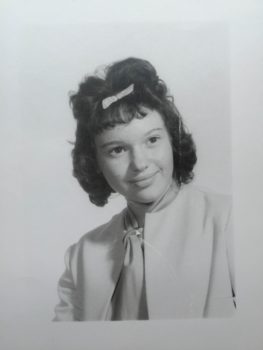
Moreover, I didn’t just have a weight problem: I was a low-bottom binger, eating for a fix and dieting as an insidious hobby. I first achieved obesity in early childhood, forming all those fat cells that conventional wisdom dictates should doom me to weight issues for life. They have not.
According to family lore, I almost starved in infancy because I couldn’t digest milk from a cow or a goat (no one thought of mother’s milk in 1950). Buttermilk evidently saved the day. I loved it. And later I loved most of the foods I was given: fried chicken, meatloaf, and hamburgers, cookies and snack cakes and ice cream, scrambled eggs and Wonder Bread and Frosted Flakes (with skim milk, of course, to save on calories).
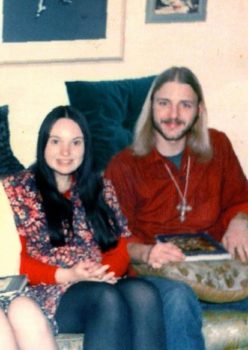
Calories were a big deal in my house. My father had enriched his ear, nose, and throat practice with a thriving “diet doctor” business and he tried out all the diets, and diet pills, on his chubby only child. At one point, he and my mom bought a “reducing salon,” a precursor to health clubs, with vibrating belts and rotating rollers intended to gyrate the fat away. It never worked for me. I was a fat kid and bad for business.
As a teenager, I took over my own weight management. Diet-Rite cola and cottage cheese worked pretty well, until I realized that I could binge on cottage cheese, especially when doused with Sweet ‘n Low. My control continued to erode until eventually I could no longer stick with even a “sensible” diet. Other than some marathon water fasts in my twenties – it was easier to eat nothing than to allow a single bite to trigger my addiction – I’d just about given up.
I had become vegetarian at nineteen, based on a love of animals and an interest in yoga, which recommended a meatless diet. I was able to stay with that, other than one very low afternoon when I devoured a chicken leg from my grandmother’s oven. I knew of vegans and wanted to be one, but I slipped and slid in my attempts. It was hard to stand in the 7/11 late at night looking for solace foods, reading labels and finding that everything contained whey or milk powder or egg albumin. And when I tried to pull myself back from a binge, the prevailing sentiment – which cycles through the popular media to this day – was high protein. I ate poached eggs and cheddar cheese and yogurt, until I binged on the dairy products and then invited back sugary foods to join the misery.
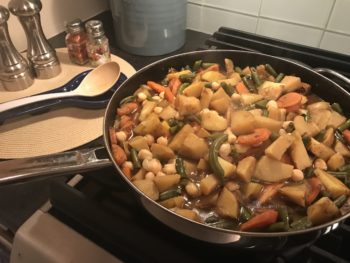
At thirty-three, married with a baby daughter, I was desperate for relief. I’d been in and out of Overeaters Anonymous for almost a decade, but when I went back this time, I surrendered in earnest. The first of OA’s 12 Steps says, “We admitted we were powerless over food…” and I’d proven that to my own satisfaction. OA would give me principles to overcome addiction. My “food plan” was to be my choice. Of course I chose vegan, but this time, because of seriously working the 12 Steps and healing at the desire level, it was possible for me to stay with it, a day at a time, through triumphs, tragedies, and life on life’s terms.
At that time, “vegan” pretty much meant “whole food plant-based,” a term which had not yet been coined. There were few vegan junk foods – soda, potato chips, Planter’s Peanut Bars – and since no one had figured out how to make really good pastries without eggs, being vegan was a great protection against baked goods. No one in the pre-Ornish 80s was talking about an oil-free diet, but we knew that vegans usually avoided heart disease because we weren’t getting cholesterol and saturated fat from animal products. We also avoided the high-sat-fat plant foods – coconut products, palm oil, and cocoa butter – because that just made sense.
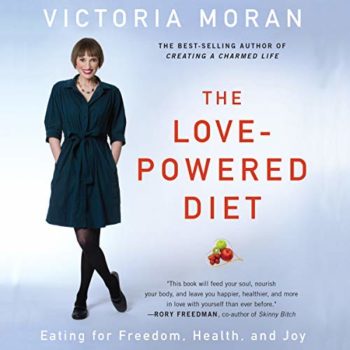
There were two basic ways that vegans ate back then, either a high-starch, brown-and-beige diet along macrobiotic lines, or a largely raw, Natural Hygiene diet with lots of fruits and vegetables, as popularized by the 1984 mega-seller, Fit for Life. I vacillated between the two. Once, during a brown-and-beige phase, my husband phoned and asked what I was doing. “Killing food,” I replied, and then corrected myself with “Cooking food.” But that Freudian faux pas belied my personal preference: a bright, fresh, colorful diet, with beans and whole grains daily but also salads, steamed vegetables – broccoli, potatoes, sweet potatoes — and fruits and berries, with some nuts and seeds, to add some life energy, what the yogis call prana.
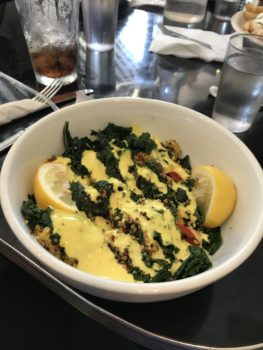
I adopted OA’s advice to eat “three meals a day with living in between” and this continues to serve me well. The problem with food addiction is not so much starting to eat as stopping once you’ve started. Sticking with breakfast, lunch, and dinner is not a religious edict for me, and if a meal is delayed, I’ll eat a piece of fruit with a few nuts, or drink a green juice. (I realize this is not a “whole” food, but green juice with lemon makes me feel as if I’m sipping from the fountain of youth, and I do so most days.)
I refrain from alcohol – I figure if I could develop an addiction to food, I’m not someone to cozy up to booze – and I keep processed foods to the bare minimum, allowing them in as a compromise when I’m out. As long as it’s vegan, I make a point to accept and enjoy whatever I eat. I spent thirty-three years in guilt and remorse and I’ve now lived even longer without it.
At seventy-one, I take no pharmaceuticals and, so far, have avoided the health problems that plagued members of my family of origin long before they reached this age. I realize that health is about more than food and I can’t predict the future, but “just for today,” to borrow some 12 Step vernacular, I am healthy and grateful.
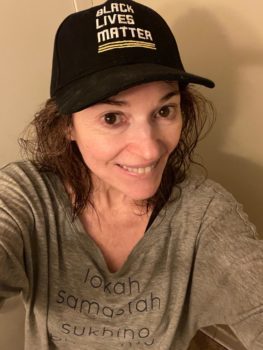
Victoria Moran is the author of thirteen books and the founder and director of Main Street Vegan Academy. She is a student of yoga philosophy, currently working on her next book, Age Like a Yogi. Her book, The Love-Powered Diet: Eating for Freedom, Health and Joy, is now also available as an audiobook on Audible.

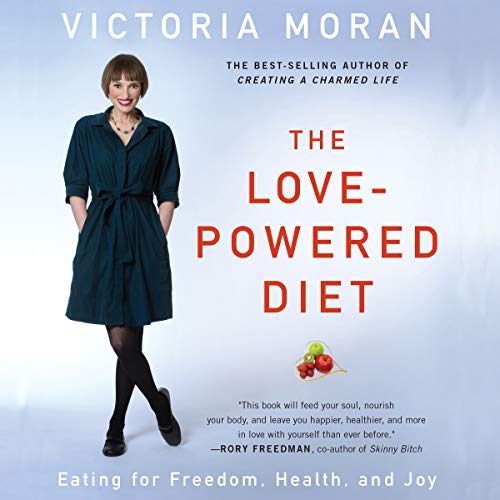
Do you have a recipe for the dish on the stove? Looks delicious, healthy, and satisfying! Thank you for this article and all you do. <3
Hi, Lesley —
Sorry I’m just seeing this now. I don’t have the recipe, although I did put one together for Andrew Spudfit Taylor’s book: https://www.amazon.com/Spud-Fit-potato-based-eating-living-ebook/dp/B07JPMCH4T.
Good wishes,
Victoria
No recipes — just sautéed onions and garlic, add pre-steamed veggies and kind of “Thanksgiving spices” — marjoram, sage, basil, that kind of thing — and it’s perfect.
Another great article, Victoria. I’m going to pull that book off of my shelf and give it a revisit. Love, Starr. PS – Have not missed one day of Younger By The Day in 2021!
Thank you, Starr. I miss you so much.
Excellent article, Victoria. Thanks for sharing your experience, strength, hope, and health success.
Thank you, Linda. You’re kind to say so. I miss seeing you and everybody in person. One of these days …
Victoria, thanks so much for sharing your inspiring story in this article. It is just the reminder that I needed to read at this very moment. I have fell so far off the healthy eating wagon and I need to get back on it like today. 9.1.21 and so it shall be. Can’t wait to see you in person. Love/Miss Your Energy!
Thanks Again for Sharing,
K
Thanks, Kay: I believe in you.
Thank you, Lisa. I know everybody’s path is different, but every time I read of how someone overcame anything, it makes me feel more confident about overcoming limitation that are still in front me.
Thank you for being transparent and sharing so much. I can relate to much of this … still working at it myself!
Victoria, I just love your writing!! Thanks for sharing your personal story. It’s such a testament to this way of eating, that you are not on any pharmaceuticals. Impressive!
Thank you, Maureen … You couldn’t have paid me a higher compliment.
I have your Love Powered Diet audiobook and I loved listening to it. The reader has a nice easy to listen to voice. I highly recommend it for those with an eating disorder or just to empathize and understand those who face this challenge. Look at you now! You’re an inspiration,